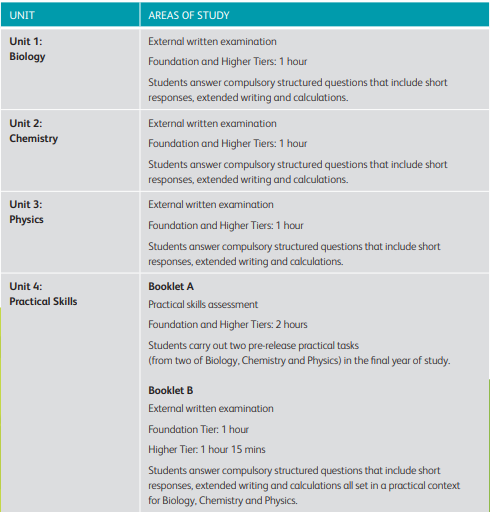GCSE – DOUBLE AWARD AND SINGLE AWARD SCIENCE
GCSE – Double Award Science
GCSE- Single Award Science

Introduction
A time allocation of ten periods will be provided. Biology, Chemistry and Physics components are taught separately by specialist teachers. The scheme of assessment will be unitised and consists of three units in Year 11 and three terminal units in Year 12 with practical skills assessed in practice and through a written examination. Two grades are awarded, hence the name Double Award Science.
Course Content & Method of Assessment
Tier Grades covered
Higher A*A* – GG
Foundation CC – GG
Double Intermediate grades such as A*A or BC are also awarded.
The table below indicates the different specification areas and their corresponding weighting.
| Unit | Content | Weighting |
| Biology Unit 1 (B1) | Cells, Living Processes and Biodiversity | 11% |
| Chemistry Unit 1 (C1) | Structures, Trends, Chemical Reactions, Quantitative Chemistry and Analysis | 11% |
| Physics Unit 1 (P1) | Motion, Force, Moments, Energy, Density, Kinetic Theory, Radioactivity, Nuclear Fission and Fusion | 11% |
| Biology Unit 2 (B2) | Body Systems, Genetics, Microorganisms and Health | 14% |
| Chemistry Unit 2 (C2) | Further Chemical Reactions, rates and equilibrium, calculations and organic Chemistry | 14% |
| Physics Unit 2 (P2) | Waves, Light, Electricity, Magnetism, Electromagnetism and Space Physics | 14% |
| Unit 7: Practical Skills | [A] Practical Skills
[B] External Written Examination set in a practical context for Biology, Chemistry and Physics |
7.5%
17.5%
|
Career Opportunities
You must achieve good grades in Double Award Science if you want to be a doctor, dentist, nurse, pharmacist, optician, speech therapist, physiotherapist, medical physicist, veterinary surgeon, veterinary nurse; an engineer or technician of any kind, whether in brewing, fashion, leather or printing; any kind of research scientist – astronomer, biochemist, environmental scientist, forensic scientist; a primary or post primary teacher.
Single Award Science:
The CCEA specification in GCSE Single Award Science provides a broad, coherent and practical course that develops confidence in and a positive view of science.
It encourages you to appreciate the value of science in your life and in the wider world.
Aims:
This specification aims to encourage you to:
• develop your knowledge and understanding of the material, physical and living worlds;
• develop your understanding of the nature of science and its applications and the
interrelationships between science and society;
• develop your understanding of the relationships between hypotheses, evidence,
theories and explanations;
• develop and apply your observational, practical, enquiry and problem-solving skills
and understanding in laboratory, field and other learning environments;
• develop your ability to evaluate claims based on science through critical analysis of
the methodology, evidence and conclusions; and
• develop your skills in communication, mathematics and the use of technology in
scientific contexts.
A single grade is awarded, hence the name Single Award Science.
UNIT AREAS OF STUDY

